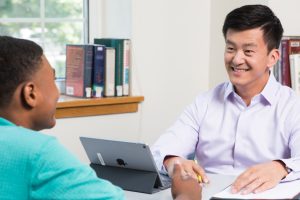Description
Part of a series on schooling during COVID-19, this webinar features education professionals and experts at the USC Rossier School of Education. Among other questions, the panel seeks to answer the following: What are the high-level equity issues involved in restarting America’s schools during the COVID-19 pandemic? What students are most likely to be overlooked, and how do we prevent that? How we do begin to understand the psychological and social-emotional needs of students, and what preparations should be happening right now?
Who Will Benefit
– Educational leaders looking to equitably reopen K-12 schools and ensure all children have access to learning during COVID-19
– Those seeking to understand the different racial equity issues faced by various schools
– Educators hoping to learn more about community disparities underscored by the pandemic
About Our Featured Faculty
Pedro A. Noguera is the Emery Stoops and Joyce King Stoops Dean of the USC Rossier School of Education. A sociologist, Noguera’s research focuses on the ways in which schools are influenced by social and economic conditions, as well as by demographic trends in local, regional and global contexts. He is the author, co-author and editor of 13 books. Prior to being appointed Dean of the USC Rossier School of Education, Noguera served as a Distinguished Professor of Education at the Graduate School of Education and Information Studies at the University of California, Los Angeles. Before joining the faculty at UCLA he served as a tenured professor and holder of endowed chairs at New York University (2004-2015), Harvard University (2000-2003) and the University of California, Berkeley (1990-2000).
Shaun Harper is a Provost Professor of Education and Business at the USC Marshall School of Business and USC Rossier School of Education. Harper studies racial, gender and LGBT issues in corporations, law firms, Hollywood production companies, K-12 schools and universities. He also is an expert on college sports. Harper has consulted with more than 200 businesses and institutions on strategies related to equity, diversity and inclusion. He has published 12 books and more than 100 peer-reviewed journal articles and other academic publications, and procured $13 million in research grants. His research has been cited in over 10,000 published studies. The Wall Street Journal, New York Times, Fortune, Washington Post, Black Enterprise and several thousand other news outlets have quoted Professor Harper and featured his research. He has interviewed on CNN, ESPN and NPR. Prior to becoming a faculty member, he was assistant director of MBA Admissions for the Indiana University Kelley School of Business. Harper spent a decade at the University of Pennsylvania, where he was a tenured full professor.
Mary Helen Immordino-Yang, EdD, studies the psychological and neurobiological bases of social emotion, self-awareness and culture and their implications for learning, development and schools. She is a professor of education at the USC Rossier School of Education, a professor of psychology at the Brain and Creativity Institute, a member of the Neuroscience Graduate Program Faculty at USC and director of the USC Center for Affective Neuroscience, Development, Learning and Education (CANDLE). Immordino-Yang was elected 2016-2018 president of the International Mind, Brain and Education Society by the society’s membership. She is serving as a distinguished scientist on the Aspen Institute’s National Commission on Social, Emotional and Academic Development, where she was selected to the sub-committee of six scientists and educators drafting a working definition of SEAD. She is appointed to the National Academies of Sciences, Engineering, and Medicine’s Committee on the Science and Practice of Learning.






